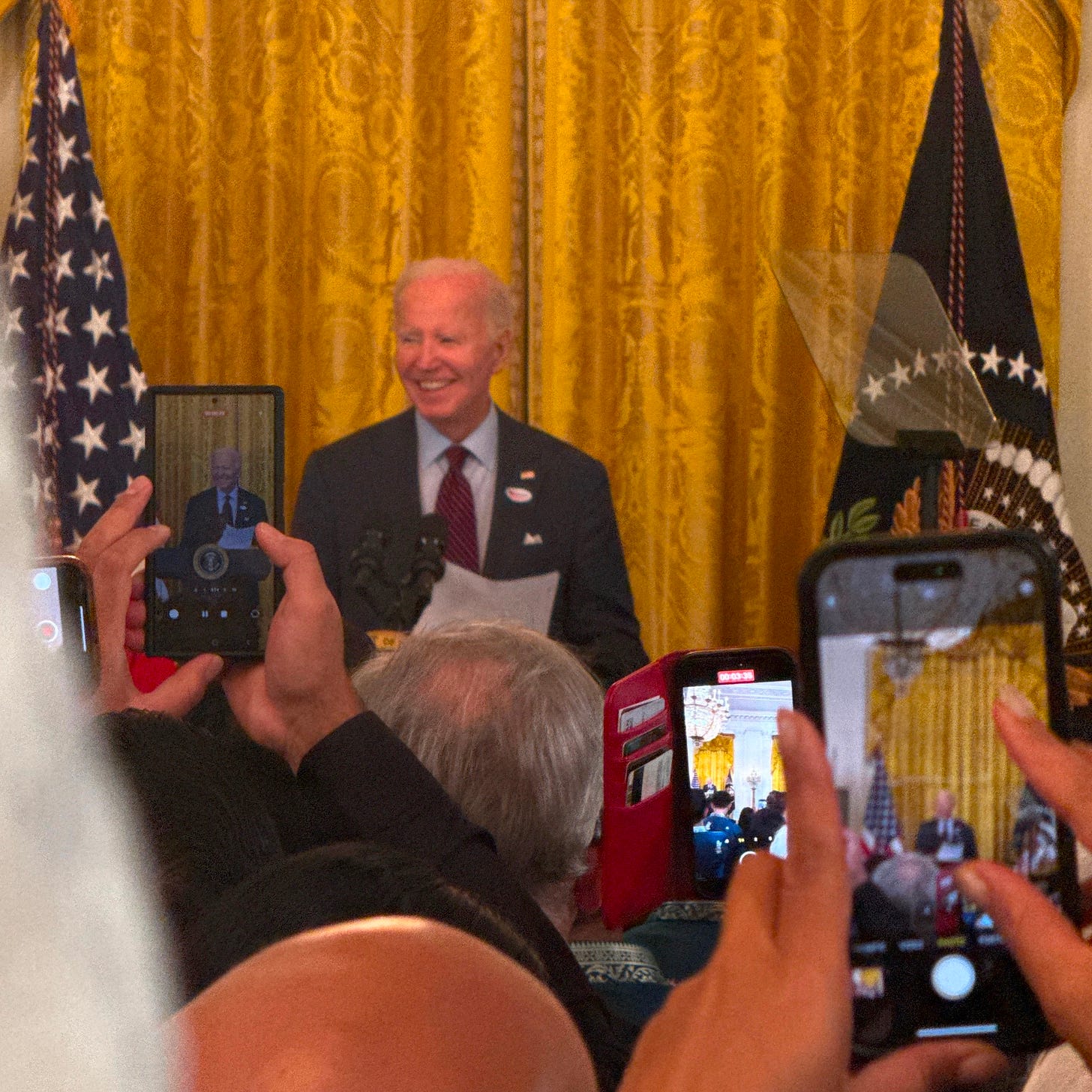I went to the White House for its Diwali reception
More than 600 Indian Americans from around the United States gathered for what has become a regular tradition across presidencies to commemorate the Hindu holiday.
Issue #81
Hi all —
Every U.S. presidential administration over the last 20-some years has recognized Diwali, the annual festival of lights, in some way in Washington, D.C. (Diwali, also known as Deepavali, is observed by Hindus, Sikhs, Jains and Buddhists.)
Bill Clinton issued a statement marking the holiday, but there was reportedly no ceremony. George W. Bush’s adviser Karl Rove hosted a lighting of the diya in the Indian Treaty Room. Barack Obama shared video wishes and lit the symbolic lamp in the Oval Office. Donald Trump lit a diya in the Roosevelt Room. Joe Biden hosted celebrations as vice president and now president, including this year, on Monday.
It was a surprise to receive an unexpected invite from the White House. I figured I would attend as a nonpartisan journalist, but also as a proud American with South Asian/Indian roots and a Hindu who celebrates Diwali. As a writer of this newsletter and reporter covering South Asian American communities, I was also inherently curious about this nearly annual tradition for the diaspora in Washington.
So I, along with more than 600 Indian Americans from across the country, showed up to Monday’s event, going through multiple security checkpoints to enter the White House’s East Wing.
As we all walked through the storied corridors, there were musicians and performers setting the ambiance. After entering the main White House building’s first floor, the center hallway was open to mingle, and we could explore some adjoining rooms: the state dining room, the Red Room, the Blue Room, and the Green Room.
In the giant East Room, we all gathered to hear remarks from NASA astronaut Sunita Williams (who shared a video message from the International Space Station), Surgeon General Vivek Murthy and President Biden.

This year’s Diwali reception was supposedly the largest in White House history. I tried to gauge the mix of the more than 600 attendees, a wide range of ages, generations and professional backgrounds from across the United States.
There was an actor from Netflix’s “Never Have I Ever,” a former Miss America, a real estate magnate from the Southwest, a finance executive from New England, the founder of a beloved ice cream business, a former Kamala Harris adviser, professors from coast to coast, Instagram/TikTok influencers, media entrepreneurs, college students. I spotted Congressman Shri Thanedar (D-Michigan), one of the members of the “samosa caucus” in Congress. I was starstruck meeting Dr. Murthy, who as surgeon general has highlighted the modern perils of social media, loneliness and mental heath challenges. I fanboyed about his moving book on human connection, which I read this summer.
This year’s massive crowd was a pivot from 2023, when the administration’s Diwali invitations were boycotted by some prominent figures in the community, including poet Rupi Kaur, over the administration’s handling of the Israel-Hamas conflict and humanitarian crisis in Gaza.
Some attendees said that they were hoping to get a glimpse of Vice President Harris, who was campaigning in Michigan that evening. Others commented that they wanted to see Biden before he departs the White House for good in just a few months.
As the event closed, the crowd moving toward the exit, I met a gentleman walking alongside who had attended multiple White House Diwali events. He noted how the occasions had transcended both Democratic and Republican administrations.
The primary Diwali theme of light over darkness can also transcend any particular faith — a universal theme Biden spoke about Monday. It also felt especially timely near the close of a polarized election season, just a week out from Election Day.
Happy Deepavali, to those who celebrate. Happy Halloween, to all the kiddos, as well.
Thanks for reading,
Vignesh
What’s your name story?
This is a long-term project, so we still want to hear from you as we chronicle stories about names in South Asian American communities. If you (or anyone you know) is interested in sharing a story about your name, feel free to call or text us at 347-470-0064 or fill out this online form. Nothing will be published until we speak with you and get your consent. (Thanks to everyone who has already shared!)
Red, White and Brown Media facilitates substantive conversations through the lens of South Asian American race and identity — via journalism, social media and events. Please tell your friends and family to subscribe to this newsletter.








So wild we didn't run into each other!